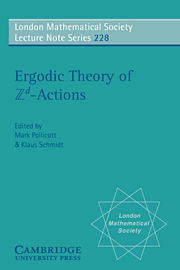Book contents
- Frontmatter
- Contents
- Introduction
- Surveys
- 1 Ergodic Ramsey Theory
- 2 Flows on homogeneous spaces
- 3 The variational principle for Hausdorff dimension
- 4 Boundaries of invariant Markov Operators: The identification problem
- 5 Squaring and cubing the circle – Rudolph's theorem
- 6 A survey of recent K-theoretic invariants for dynamical systems
- 7 Miles of Tiles
- 8 Overlapping cylinders: the size of a dynamically defined Cantor-set
- Research Papers
3 - The variational principle for Hausdorff dimension
Published online by Cambridge University Press: 30 March 2010
- Frontmatter
- Contents
- Introduction
- Surveys
- 1 Ergodic Ramsey Theory
- 2 Flows on homogeneous spaces
- 3 The variational principle for Hausdorff dimension
- 4 Boundaries of invariant Markov Operators: The identification problem
- 5 Squaring and cubing the circle – Rudolph's theorem
- 6 A survey of recent K-theoretic invariants for dynamical systems
- 7 Miles of Tiles
- 8 Overlapping cylinders: the size of a dynamically defined Cantor-set
- Research Papers
Summary
Introduction
The variational principle for entropy highlights the significance of measures of maximal entropy. Indeed, these are widely considered to be the most important invariant measures from a purely dynamical perspective. However, other invariant measures can be better adapted to the geometry. This is illustrated by the self-map f of [0, 1), defined by f(x) = 3x/2 for x ∈ [0, 2/3) and f(x) = 3x − 2 for x ∈ [2/3, 1). Since f is conjugate to the 2-shift, its topological entropy is log 2; Lebesgue measure is invariant under f, but does not have maximal entropy.
More generally, given an expanding self-map f of a compact manifold (which by a result of Shub must then be a torus), it is generally accepted that the measure with the greatest geometric significance among f-invariant measures is the one equivalent to Lebesgue measure. (See Krzyzewski and Szlenk (1969) for the existence of such measures.) If instead we consider an expanding map f : K → K of a compact set K of zero Lebesgue measure, the closest analogue to such a measure is an f-invariant measure of full Hausdorff dimension. This survey addresses the existence question for such measures, which is mostly open, and discusses known partial results. We sketch some of the proofs, and give references for the complete arguments (which are somewhat technical).
Consider a smooth map f : U → M, where U ⊂ M is open and M is a Riemannian manifold.
- Type
- Chapter
- Information
- Ergodic Theory and Zd Actions , pp. 113 - 126Publisher: Cambridge University PressPrint publication year: 1996
- 1
- Cited by



